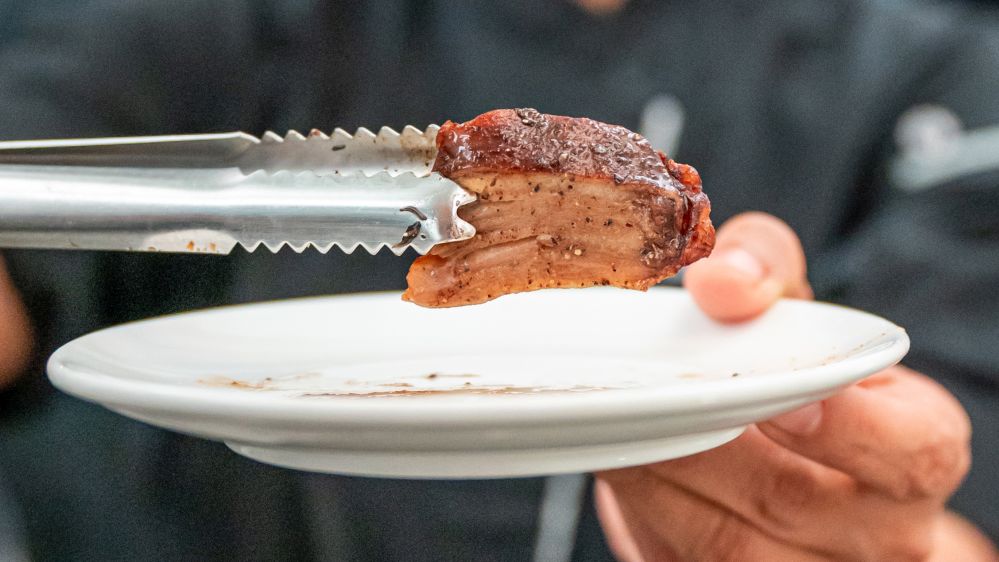[Disclosure: AgFunderNews’ parent company is AgFunder]
Singapore-based cultivated meat startup Meatiply has raised $3.75 million in the first close of a seed round co-led by AgFunder and Wavemaker Partners and supported by SEEDS Capital, the venture arm of Enterprise Singapore.
A second close is scheduled to take place in the first quarter of 2024.
The new funds will help Meatiply expand its R&D capabilities and scale up production for more extensive product co-development with commercial partners, with a new facility expected to come online next year ahead of a commercial launch in 2026, said cofounder and CEO Dr. Elwin Tan.
“Meatiply’s scientifically grounded approach utilizes a combination of different cell types (muscle, fat, skin, etc) to generate natural compounds responsible for the sensory and nutritional qualities of meat and meat products.
“Additionally, targeting the production of natural compounds with health benefits allows Meatiply to target the functional foods market. Meatiply’s cells can produce ingredients for use in value-added conventional food production and plant-based products to form compelling hybrid products.”
Cofounder and CSO Dr. Jason Chua added: “Our focus on the production of complex value-added compounds using cells will allow us to create cultivated meat products with added health benefits. This strategic entry point will give consumers more reasons to embrace cultivated technologies. Besides meat, we are also positioned for opportunities to commercialize products for the nutraceutical and wellness market.”
Co-development partnership model
Founded in 2021 by Dr. Elwin Tan, Dr. Jason Chua, Dr. Benjamin Chua, and Prof. Teh Bin Tean, researchers at Singapore’s Agency for Science, Technology and Research (A*STAR) and other institutions, Meatiply is initially focusing on a b2b business model through a co-development partnership model, Tan told AgFunderNews.
“We plan to work with existing food manufacturers to create a product together. Some of the challenges that we’ve seen companies face is having to build a brand and the technology at the same time, but what we’re good at is building the tech.
“So we’re looking at doubling down on that and working with existing food manufacturers to leverage on their capabilities with distribution, sales and marketing, so that we don’t have to build a brand from scratch, but will still be able to get products out there.”
‘Significant cost reductions downstream’
Meatiply is one of the very few cultivated meat startups to attract seed funding this year, added Tan. “Despite a more cautious investment approach this year, investors were excited by our development strategy.
“Likewise, we are thrilled that our investors share our vision to leverage Meatiply’s strong upstream capabilities to create complex and functional products that not only justifies the use of animal cells, but also result in significant cost reductions downstream.”
John Friedman, Asia director at AgFunder, added: “We’re highly impressed by what the Meatiply team has achieved in a short amount of time and with relatively limited external funding. We firmly believe there is a place for cultivated meat technology in our future food system, and are encouraged by Meatiply’s practical approach towards product development and go to market strategy.”
“Meatiply has distinguished itself through strong technical competencies which have allowed it to develop a wide repertoire of structured meat and meat derivatives focusing on the Asian palette. Despite being a young company, it was able to showcase three structured meat prototypes, including Asia’s first cultivated smoked duck breast, within 18 months.” Kaixin Tan, general manager of SEEDS Capital.
‘Different kinds of cultivated products that people in the space have not seen before’
Speaking to AgFunderNews at last month’s Asia-Pacific Agri-Food Innovation Summit in Singapore,Tan said: “We use a variety of cell types: muscle cells, fat cells, collagen producing cells… We’re currently culturing these cells separately and putting them together. That way, we have very good control over what goes into the final products. Of course, we are also exploring co-culture, because there’s some efficiencies that could be gained from co-culturing as well.
“We have a very innovative product strategy that includes structured products and unstructured products, and some new exciting ones that we’re not revealing at the moment. Investors have been very excited about our strategy, which could create very different kinds of cultivated products that people in the space have not seen before.”
Driving efficiencies in cell proliferation and differentiation
Asked about the efficiency of Meatiply’s production process, he added: “We have a multi-pronged approach around increasing the efficiency of cell proliferation and differentiation. We look at the media components that go in, we formulate our own media for different stages of cell growth and for different cell types and for different species.
“We also look at the kinds of genes that can be targeted, specifically, to drive proliferation or to drive differentiation with novel technologies.”
To date, Meatiply has developed three prototypes (smoked duck breast and two different chicken products), said Tan: “We believe they were probably some of the most impressive prototypes that any company has released as a first attempt. The prototypes contain at least 50% [animal] cells.”

‘Consumers are not going to budge if it’s going to just be exactly the same [as conventional meat]’
As for scalability, he said, “It’s true that cultivated meat has a scale challenge… so we’re taking an innovative approach around product strategy to try and sidestep some of these problems first, as we build our solutions.”
He added: “We’re also working very closely with companies that produce enabling technologies, not only because we’re exploring incorporating their products into our process, but as a way to generate revenue, we’re helping them assess their products because of the great cell lines that we have.”
Asked about the consumer appeal of cultivated meat, he said: “We understand that consumers are not going to budge if it’s going to just be exactly the same. So that’s why we’re creating products that are going to be more healthy and more nutritious than conventional [meat products].”
Singapore will be Meatiply’s first target market “because it’s our own country, and has the most well developed regulatory framework,” he said. “But we also have our eyes set on the rest of East Asia, including South Korea, Japan and China.”

Further reading:
Crunch time for cultivated meat: ‘Probably 70-90% of players will fail in the next year’





